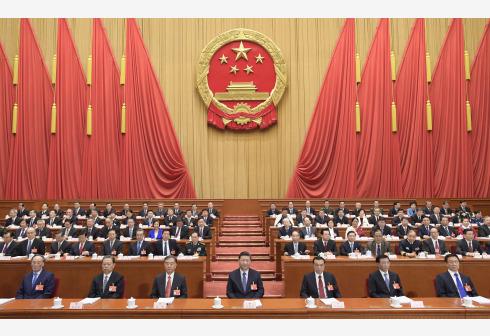
BEIJING, March 8 (Xinhua) -- China expects to see wider opening-up as it pledges to do more to attract foreign investment and promote global cooperation at the ongoing annual "two sessions."
"We will promote all-round opening-up and foster new strengths in international economic cooperation and competition," Chinese Premier Li Keqiang said when delivering the government work report to the annual legislative session Tuesday.
At the session, further relax of controls over market access has been announced, a draft foreign investment law will be deliberated, and the Belt and Road cooperation has been promoted.
UNVEILING OPPORTUNITIES
The government will further shorten the negative list which outlines fields off-limits to foreign investors, Ning Jizhe, deputy director of the National Development and Reform Commission, told a press conference on the sidelines of the annual legislative session Wednesday.
China will roll out more opening measures to the agriculture, mining, manufacturing and service sectors, and allow wholly foreign-funded enterprises to operate in more sectors, Ning said. John Huang with the British information service provider Experian believes that international investors will welcome China's further opening-up.
"Some core industries, once considered to be 'the most difficult areas to open up,' such as automobile manufacturing and financial services, are now welcoming foreign investment," said Huang, managing director for decision analytics of Experian Greater China.
"The Chinese government's consistent commitment to opening-up has given foreign enterprises confidence about the business environment here," said SangBoem Han, CEO of LG Display from the Republic of Korea.
In July 2018, LG Display opened an OLED panel factory in south China's Guangdong Province with a total investment of 46 billion yuan (6.9 billion U.S. dollars).
China saw a record foreign direct investment of 135 billion U.S. dollars in 2018 despite a global economic downturn and rising protectionism.
"In the early days, foreign firms received preferential policies regarding land, electricity and taxes in China," Han said, "but more recently, the government has increased its protection of intellectual property and improved efficiency."
FOREIGN INVESTMENT LAW
On Tuesday, Premier Li emphasized opening up based on rules and related institutions. This will help China better conform with the international rules, said Zhang Jin, a national political advisor and businessman from Guangdong.
"This is also in line with China's further integration with globalization and engagement in international competition," Zhang said.
A highlight at this year's "two sessions" is the draft foreign investment law, which is to be submitted to this year's session of the 13th National People's Congress (NPC) for review.
Once adopted, the unified law will replace three existing laws on Chinese-foreign equity joint ventures, non-equity joint ventures (or contractual joint ventures) and wholly foreign-owned enterprises.
The foreign investment law would be highly significant to protect legitimate rights and interests of foreign investors and ensure fair competition, said Loh Jen Yuh, president of China & Investment Management of CapitaLand Group, one of Asia's largest real estate companies.
"The law shows China's openness and the rule of law," said Han, who hoped that the enact of the law would further improve China's business environment.
PROMOTING GLOBAL COOPERATION
Along with the efforts to attract foreign businesses, China is also stepping up the implementation of the Belt and Road Initiative (BRI) to benefit more participants.
To date, a total of 152 countries and international organizations have signed cooperation documents with China on the BRI.
"Many countries along the Belt and Road have shown their intention to cooperate with Chinese manufacturers," said Wu Gang, a national political advisor and chairman of wind power firm Xinjiang Goldwind Science & Technology.
"We are more confident in going global under the government's favorable policies related to the BRI," said Wu, whose business has gained great market shares in Pakistan and Australia.
According to the government work report, China will continue to "promote the joint pursuit" of the BRI, aiming at "shared growth through discussion and collaboration."
China has signed free trade agreements with over 20 countries and regions. According to Zhao Ji, a national political advisor and president of China's Northeastern University, the country's efforts to strengthen the opening-up are especially important against the weak global economic growth.
"The development of China, which has been closely connected with the world, will continue to play a key role in promoting globalization," Zhao said.


















Latest comments